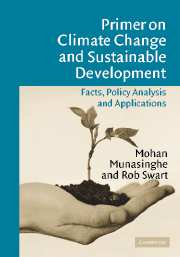Book contents
- Frontmatter
- Contents
- Foreword
- Preface
- 1 Climate change: scientific background and introduction
- 2 Future scenarios of development and climate change
- 3 Framework for making development more sustainable (MDMS): concepts and analytical tools
- 4 Interactions between climate and development
- 5 Adaptation to climate change: concepts, and linkages with sustainable development
- 6 Vulnerability, impacts, and adaptation by sectors and systems
- 7 Vulnerability, impacts, and adapation by geographic region
- 8 Mitigating climate change: concepts and linkages with sustainable development
- 9 Mitigation measures: technologies, practices, barriers, and policy instruments
- 10 Assessment of mitigation costs and benefits
- 11 Climate change and sustainable development: a synthesis
- Index
- References
8 - Mitigating climate change: concepts and linkages with sustainable development
Published online by Cambridge University Press: 25 December 2009
- Frontmatter
- Contents
- Foreword
- Preface
- 1 Climate change: scientific background and introduction
- 2 Future scenarios of development and climate change
- 3 Framework for making development more sustainable (MDMS): concepts and analytical tools
- 4 Interactions between climate and development
- 5 Adaptation to climate change: concepts, and linkages with sustainable development
- 6 Vulnerability, impacts, and adaptation by sectors and systems
- 7 Vulnerability, impacts, and adapation by geographic region
- 8 Mitigating climate change: concepts and linkages with sustainable development
- 9 Mitigation measures: technologies, practices, barriers, and policy instruments
- 10 Assessment of mitigation costs and benefits
- 11 Climate change and sustainable development: a synthesis
- Index
- References
Summary
Review of basic concepts and methodology
Mitigation is defined as an anthropogenic intervention to reduce the sources or enhance the sinks of greenhouse gases. Mitigation is required to meet the ultimate objective of the United Nations Framework Convention on Climate Change (UNFCCC): to stabilize the concentrations of greenhouse gases in the atmosphere. For the most important greenhouse gas – carbon dioxide – this requires that global emissions decrease to a very small fraction of current emissions. The dates upon which global carbon dioxide emissions would have to peak vary along with the targeted stabilization level. For example, for stabilization at 550 ppmv – the goal agreed by the EU – they would have to peak between 2020 and 2030, and for stabilization at 450 ppmv, between 2005 and 2015. The greater the emissions reductions and the earlier they are introduced, the smaller and slower global warming will be. Shorter-lived greenhouse gases such as methane respond more quickly to changing emissions. For gases with atmospheric sinks (e.g. methane and nitrous oxide), stable emissions lead eventually to stabilized concentrations.
A common approach to assessing the potential for mitigation has the following steps.
Identify technologies and practices that can reduce emissions or enhance their sinks in a particular sector, within a specific region.
Assess the potential to implement these technologies and practices by first identifying the barriers to their implementation (e.g. costs) and then identify the opportunities to overcome these barriers through policies and measures in a cost-effective way.
- Type
- Chapter
- Information
- Primer on Climate Change and Sustainable DevelopmentFacts, Policy Analysis, and Applications, pp. 269 - 303Publisher: Cambridge University PressPrint publication year: 2005



